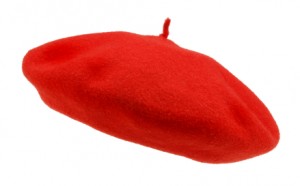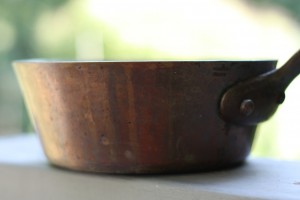 I have no idea why this happens, but I can set my watch by it:
I have no idea why this happens, but I can set my watch by it:
The minute the weather starts to cool down, I stop cooking my beloved Asian food. My Vietnamese and Thai and Chinese cookbooks go back on the shelf. I bookmark my favorite Asian food websites so that I can come back to them in the depths of winter when only the brightness of lemongrass and tamarind can shake me from my doldrums. And then, stranger things begin to happen: I start referring, in conversation, to the classic Simple French Food as “Richard,” in a most pompous and affected manner that is really not at all like me, and that confuses and annoys Susan. I re-read Elizabeth David’s French Provincial Cooking and Edouard de Pomiane’s brilliant and often hilarious Cooking with Pomiane. La Bonne Cuisine comes off my low shelf (the one where all the important books sit) and winds up on my nightstand. And the Chez Panisse books start to teeter all over the kitchen and end up by April coated with an impermeable sort of floury crust that I then have to chip off with a razor blade.
I haven’t figured out why this happens, exactly, but looking back, I can safely say that it began in the late 80s, when I was working at Dean & Deluca, and my boss, while placing an order with the Mauviel people for the copper that would line the store from stem to stern, ordered a short, squat pot for himself specifically in which to prepare a daube. It was early October, and chilly.
 “Daube time,” he said, gleefully, zipping up his wool jacket, and carrying the pot out of the store like it was a baby. That season, he also introduced me to the works of A.J. Liebling and M.F.K. Fisher (both of whom were experiencing a resurgence in popularity thanks to North Point Press and the brilliance of publisher Jack Shoemaker); Elizabeth David; and Richard Olney, who walked in one day after a visit to the French Culinary Institute down the street. We all stopped what we were doing and watched him pause at the cheese counter and stroll through the book department, and then, without saying a word, leave.
“Daube time,” he said, gleefully, zipping up his wool jacket, and carrying the pot out of the store like it was a baby. That season, he also introduced me to the works of A.J. Liebling and M.F.K. Fisher (both of whom were experiencing a resurgence in popularity thanks to North Point Press and the brilliance of publisher Jack Shoemaker); Elizabeth David; and Richard Olney, who walked in one day after a visit to the French Culinary Institute down the street. We all stopped what we were doing and watched him pause at the cheese counter and stroll through the book department, and then, without saying a word, leave.
That night, I brought home Simple French Food—a work of great Olney-ian texture, complexity, and idiosyncrasy — and read his description of the bons gueuletons:
it means a meal among friends comporting many dishes washed down by great quantities of better-than-ordinary wine, lasting for hours and accompanied by much gaiety and laughter. Any non-working day is an occasion for a gueuleton.
That did it for me; having been in France only twice in my life, I was finally able to isolate one of the many things that make these enigmatic people and their food so totally captivating: the permission they give themselves to enjoy life from the most basic sustainence: food, wine, laughter, and friends.
But beyond that, of course, there were recipes for things like omelette au pain. I told my mother about it one night when I was making it for dinner.
“Bread omelette?” she said—“I could send you some money.”
And the next morning, her butcher delivered to my apartment half a dozen each of strip steaks and veal chops, all individually wrapped and ready for the freezer, most of which died a sorry death from freezer burn some months later. Clearly, she’d missed the point.
So what is this thing that happens to me every autumn, that involves the food of a place and a people so perplexing that David Lebovitz actually wrote what amounts to crib notes for American visitors hoping not to make schmucks of themselves at the local cafe? I’m still not sure. But, it’s here with a vengeance, along with my quite unfortunate habit of wearing horizontal stripes, which is never a good thing for a five foot two lady who writes about food for a living.
Oh well. Chacun son goût.
Omelette au Pain
(From Richard Olney’s Simple French Food)
If you have the slightest concern about your blood cholesterol, you should probably skip this dish, which, when baked, falls somewhere in the middle of the continuum running between omelette and panade. Finish it in the oven, as Olney suggests.
2 ounces stale but not dried-out bread, without crusts
1/2 cup heavy cream
1/3 cup freshly grated Parmesan cheese
Salt, pepper
2 eggs
2 tablespoons butter
Mash the bread with 1/4 cup of cream until the mixture forms a consistent paste, add the Parmesan, salt and pepper, the remaining cream, and work the mixture together until the consistency is smooth and creamy. The bread and cream make a lighter and more tender mixture than that of the usual omelet and it is more difficult to toss it without splashing—it may be finished in the oven.




French cooking…….a perfect time to have me and Pierre ( Peter turns into Pierre for all French occasions) over!
mais bien sur…
I understand completely, and even in southern California find the change of season changes my kitchen attitude, and the book rotation begins. (Today’s cool weather and overcast skies help.)
Shelved next to my copy of Simple French Cooking is one of my favorite summer cookbooks: Lulu’s Provencal Table, for which I only wish I could thank Richard Olney (and Lulu Peyraud). As soon as the peppers, eggplant, and tomatoes start to come into the market my ratatouille making begins!
First, Lisa, I LOVE your email address. Second, the only time my sweet pooch has ever been destructive was when she ate the cover to my 1st edition Lulu. Probably because of all the spatterings on it…….Thanks so much for writing.
I doff my beret to you, Elissa. Just made a honkin’ big vat of ratatouille yesterday, as the cats all gathered ’round, hopeful that I’d be making boeuf bourguignon as well.
Who cares that it will be back into the mid-90s by the weekend? Ratatouille is good cold, too!
Au revoir, Carol
Isn’t a bread omelet just Matzoh Brie for Goyim? 😉 I actually have two copies of Simple French Food. It’s why I now own an IPod. There is an app that synchs with my library program.